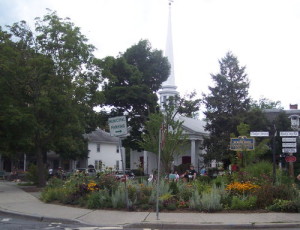Healing 1: Serving the Hungry with an Understanding Heart
“You, God, are my God, earnestly I seek you; I thirst for you, my whole being longs for you, in a dry and parched land where there is no water.” – Psalm 63:1
“That person lives in Shandaken. He shouldn’t even be here.”
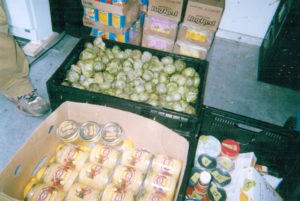
The pantry served shoppers, volunteers, hungry people. Volunteers fed everyone in the line. No exceptions.
Distributing groceries brought forgiveness and healing. Healing was an after thought of forgiveness.
For me, healing required some commitment and thought. Whether or not this was true, questions always arose:
“Am I ready to be healthy?”
“Can I get well if it’s scary?”
“Can I leave the old me aside if it’s necessary for healing?”
“Why am I going through this?”
“What is the meaning of it all?”
These questions could be painful. Healing can be hard on everyone.
The pantry line had massage therapists, Reiki practitioners, medical intuitives, and other healers.
As a healer, I know healing happens on several levels in our lives: physical, mental, spiritual, emotional, mythical. Both healing and getting well were special challenges because many of the people in the hallway, the pantry room, and out in the parking lot didn’t have health care.
While he had his office, Woodstock had Dr. Longmore. After his office closed, things were tough for many. As health care became scarce, everyone became personally involved with the differences between healing and getting well. For some, this was part of the spiritual journey.
Hunger often went beyond a plate of beans or a jar of peanut butter. That’s why food is essential to healing. That’s where homemade soup comes in.
Sharing food in the pantry helped people heal. Fresh vegetables, eggs, and Bread Alone bread offered a healing experience with abundance. As we fed the shoppers, we helped ourselves and each other.
In some cases, the shoppers became the volunteers or the volunteers joined the shoppers. Shoppers came to get food and found they could volunteer. Volunteering changed them. As a person distributed groceries, the volunteer made contact with another person and was able to smile.
Pantry experiences coaxed us out of our own problems. Offering a sense of community gives back so much more.
Do you want to be healed? Healing and feeding are connected.
Sooner or later, we all get sick. Finally, we die.
No one escapes. This truth is harder on hungry people who have no $$$ for health care.
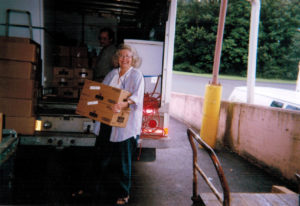
Hungry people are often blamed for their inability to deal with the situation. It’s as if it’s their fault for being down and out in Woodstock. If they lived right, they would be healthier, make more $$$ in their jobs.
If critics stopped and thought about how insufficient nutritious food, improper housing, and inadequate or nonexistent healthcare impacts a person, they might feel differently.
What did it matter that there were no jobs in the area and none of those that came open paid over $8.00 an hour?
Because they were down and out, they must be guilty of something.
They were negative thinkers, lacking faith, and basically lazy. Something.
They were gay, trans, promiscuous, alcoholics. Something.
They were freeloaders, irresponsible, flaky. Something.
Healing and getting well are two different things, acting in different ways. But, whether a person heals, gets well, or both, change happens.
“Do I want to heal?”
“Do I want to be well?”
“What if I come out of this experienced a different person?”
“What if it takes a long time?”
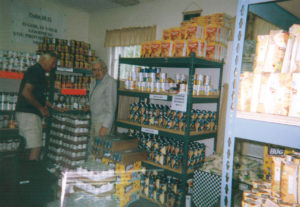
In the midst of this, the pantry offered some normalcy to the shattered lives of hungry people when they took pantry food home to wherever and whatever that was, fixed a meal, and served it to those in the household.
It was supper from the pantry.
Health issues pointed to the spiritual challenges which popped up on the path to the pantry. Healing was on the agenda. We all wanted to get well.
People getting well overcome symptoms. Getting well means doctor’s visits, therapy, pills, creams. These things were simply not an option for pantry shoppers because there was no money.
Symbolic healing occurred in the hallway on pantry days as shoppers and volunteers discussed their diabetes, PTSD, cancer, allergies.
Working and shopping in the pantry was therapy to volunteers and shoppers. These hallway conversations were cheaper than the physical and mental health services they had no money for anyway.
These conversations were essential because talking about a health issue promotes healing. Shared symptoms gave us all support, strength, validity.
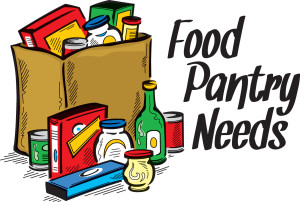
Everyone walking through the door to the pantry, whether a shopper or volunteer, was asked to leave the past behind. This experience was different for everyone. But, think about it, how can we move forward into our new lives if we never give anything up.
For some, giving up the past means letting go of things lost: the job, the home, maybe the family, self-esteem, the car, good health, money, insurance, the pet, anger, or drugs.
As the past disappears, the remaining spiritual baggage weighs less and less. Prejudices become fewer. Fears diminish. We heal!
Some things surrendered were physical, some mental, and some emotional. But, one thing is certain, whatever the category, the experiences all had a spiritual aspect.
Giving and receiving food brought everyone a little peace.
Everyone coming to the pantry heals somehow. The pantry community supports and approves hungry individuals as they climb back on the road to wellness and something offering normalcy.
Nobody just wakes up one day and says “I think I’ll go down to the local food pantry and volunteer.” People spending time in pantries all travel down the path. Healing has signposts along the way.
Some needed physical healing. Volunteers occasionally came to the pantry so ill that they were barely able to make it into the building. When this happened, I stationed them at the Items of Dignity table distributing toilet paper, shampoo, razors. They offered one roll of toilet paper and one other item to each shopper.
 Each week, Deanna slowly walked the two blocks to the pantry and then worked in the hallway a couple of hours while she gathered enough energy to return home.
Each week, Deanna slowly walked the two blocks to the pantry and then worked in the hallway a couple of hours while she gathered enough energy to return home.
“Don’t forget your roll of toilet paper, Judith. We’ve got some hand cream today. Can you use that or would you prefer tooth paste?”
When Deanna finally couldn’t work in the hallway anymore, Rachel gracefully sat at the Items of Dignity table helping shoppers choose their two items. Rachel lived in nearby Mt. Tremper. Her living situation seemed somewhat precarious because every few months she looked for a new place to live. She lived in her car a couple of times.
Thank you for reading this blog post. This is the first food pantry article on healing.
Please forward this article with your preferred social media network. Share it with a friend.
If you are interested in healing, please check out my other blog: www.reflexologyforthespirit.com.
Thanks again.
Thurman Greco
Woodstock, NY
PS: Many programs are now uploaded to YouTube. More are being added weekly. Enjoy!
![]()
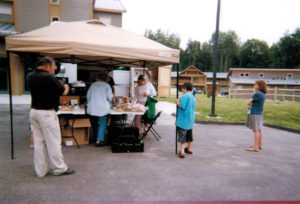

My Story and the 9 Truths I Discovered
I began my life changing journey fighting hunger on a cool autumn Thursday in Woodstock, New York in 2005 where I volunteered for the first time at the local food pantry.
I was assigned a shift with Marie Duane. I drove over to the Woodstock Reformed Church, parked my car behind the buildling and cautiously walked in. I had never been to the pantry before.
I entered the empty hallway and found the pantry on the right. I walked into the room and there it was: a small space, actually, about 12′ by 16′. Each wall supported a set of metal shelving units. Each unit stood about 6′ high and 3′ deep with 4 shelves. Most of the shelves were empty. A few shelves had some food:
cereal
tuna
soup
peanut butter.
There was a little handwritten note in front of each display:
person: 1 item, family: 1 item.
There may have been other items on shelves but I don’t remember them.
A small table stood in the center of the room. A metal folding chair was placed in front of each window.
We sat in the chairs, Marie and I, and chatted as people trickled in. We discussed the usual: weather, gardening, knitting, decorating the alter at St. Gregory’s Episcopal Church.
“Hi. How are you? Will you please sign your name here?” Each shopper signed in and noted the number of adults, seniors, and children in the household. After signing in, the person walked around the room selecting from the cereal, peanut butter, tuna, and soup. The selected food was placed on the table and bagged to take home, wherever or whatever that was.
On this morning, not blessed with any psychic knowledge, I was totally unaware of experiences waiting for me in the pantry. Never in my wildest thoughts did I envision the hall filled with hungry people, the tiny room packed with fresh produce and jammed with shoppers.
Nor did I for 1 moment ponder the push back I would experience as the number of hungry seeking food grew. Within a few short years, this 2 dozen single homeless men – mostly Woodstock’s colorful characters – had swelled (due to a tanking economy) to over 300 people weekly. This number finally approached 500 people weekly before it was all over.
Now, in the autumn of 2015, our stock market experiences numerous “corrections”. I realize I learned some things over the years which, for me, are ground truths about the pantry.
Feeding the hungry with dignity is the most important thing.
Single homeless men are now far outnumbered by members of the Struggling Class, households of working people holding down 2 and 3 jobs just to pay the rent and buy the gas to get to work.
The 3 most hot button words in the English language are food, sex, and money. These 3 words are concerned with a person’s core beliefs, emotions, and spiritual attitudes. Food and money, or the lack thereof, loom large in pantries.
The sidewalks in our communities and cities have become wards of untreated mentally ill people. In our great nation we don’t hospitalize or otherwise treat many of our mentally ill. Instead, they they are incarcerated.
Some of these untreated mentally ill happen to be homeless. Homeless is not a category of people. It’s just a situation that happens. It can happen to anyone.
The 50+ senior population has many who lack enough $$$ for food and are largely a silent group. The bottom line is this: When our grandparents don’t get enough to eat, they often get sick.
I’m seeing a whole generation of children who have never been inside a grocery store.
Shoppers at our pantry can get a 3-day supply of food weekly. Their job is to make it last 7 days. Many share this food with a pet. Often, the only thing a person has left from a prosperous past is the dog.
The most difficult thing I see in the pantry is a Korean War vet getting food. Something I just can’t understand is how a person who served in a very brutal war, and subsequently spent an adult life working and paying taxes should have to be in a food pantry line in his old age.
Much of the food available to the hungry in food pantries is diverted from its trip to the landfill.
There is absolutely no excuse for anyone in our great nation to go hungry.
Thank you for reading this blog. The story is true. The people are real.
Please refer this article to your preferred social media network. Share this story with friends or relatives who might be interested.
Don’t forget to join the email list.
Thurman Greco
